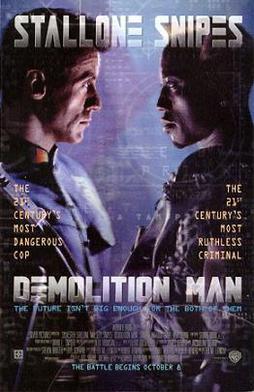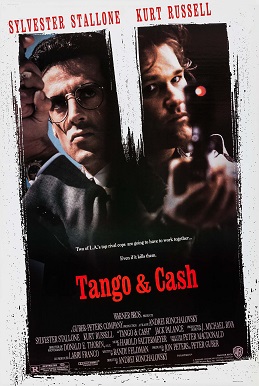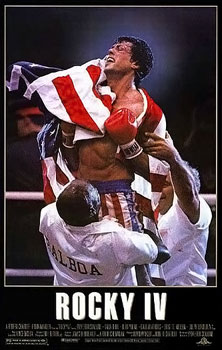I’ve made no secret of my love for Alamo Drafthouse [Yonkers]. In the past year it has become one of my favorite places to trek to (I do have to cross a big important river to get there), especially for classic films and classic film marathons (except for that time I totally bombed trying to underplay a Nic Cage impression, but c’est la vie), not to mention great food and drink.
Again I say, if you have one near you and you’ve not been there. you’re doing yourself a disservice. Go check it out at your earliest convenience.
Anyway, if you haven’t realized it by now, my latest excursion there (now more than two weeks ago; hurray for expediency) was for Stallone Zone, a marathon of four surprise movies starring (if not also written and directed by) Sylvester Stallone (all on glorious 35mm prints), curated by Drafthousers Cristina Cacioppo (who chose the films) and Austin hipster-type Greg MacLennan (who brought the prints, and many other wonderful visual goodies).
Now, let’s be real, you have to be in a certain mindset to truly enjoy a typical Stallone movie, and I’m perfectly fine going there, because I like having a good time. Stallone represents escapist entertainment at its adrenaline-fueled peak. Quite frankly, Stallone Zone was probably the most fun I’ve had in one day so far this year, and that’s the honest truth; and myself and all the friends I brought can’t wait to see what’s on tap for the next Drafthouse marathon.
But, I digress. On to the movies. These’ll be a bit shorter than my typical reviews since I have almost a handful to get through, not to mention there’s probably not much meaningful prose I can add after 20+ years.
Directed by Andrei Konchalovsky [and Albert Magnoli (Uncredited)]
Written by Randy Feldman
Cast: Sylvester Stallone, Kurt Russell, Teri Hatcher, Jack Palance, Brion James, James Hong, Marc Alaimo, Philip Tan, Michael J. Pollard, Robert Z’Dar, Lewis Arquette, Edward Bunker, Michael Jeter, Clint Howard, Adolfo ‘Shabba-Doo’ Quinones, Glenn Morshower, Billy Blanks, Geoffrey Lewis
Soundtrack: Harold Faltermeyer
How serious Russian filmmaker Andrei Konchalovsky ever got involved with this project (more on Russian cinema later), the world may never know, because this is action-comedy at it’s finest. I dare say this movie is proto-Hot Fuzz
, because it’s definitely not a parody, but it knows what it is and makes no apologies for never getting too, too serious.
Stallone wonderfully plays against type as the uptight and slightly foppish Ray Tango while Kurt Russell does his usual thing with a little more lightheartedness as the fast and loose (if not downright slovenly) Gabriel Cash. Throw in Jack Palance (and his lovely mice…over and over so you don’t forget) as your main villain and a whole tanker-truckload of snappy one-liners, and you’ve got a recipe for some big, burly laughs and a lot of [occasionally over-the-top and] enjoyable action.
I had watched this movie only once before, and I was surprised at how much I had forgotten about, but was delighted to see again. I don’t know if John J.B. Wilson people had less of a sense of humor about themselves in 1989-90, because this movie was panned enough at the time to earn three Razzie nominations, but who cares about that now? I certainly don’t.
★★★★☆ (Remember, this is an action-comedy.)
Movie #2: Paradise Alley (1978)

Written and Directed by Sylvester Stallone
Cast: Sylvester Stallone, Lee Canalito, Armand Assante, Frank McRae, Anne Archer, Kevin Conway, Terry Funk (yes, THAT one), Tom Waits (yes, THAT one), Joe Spinell, Frank Pesce, Frank Stallone
Soundtrack: Bill Conti
If you go to a Drafthouse marathon like Caged or Stallone Zone, you can always count on at least one really obscure pick, and this time it was Paradise Alley. I don’t want to say too much about this film in terms of the plot, as I’d suggest you just watch it to check it out, but this movie is so Stallone that he even sings the theme song. Apparently this was actually the first movie he wanted to make, but it wasn’t something he could get financing for until after Rocky was a raving success.
The basic premise is that three brothers in post-WWII Hell’s Kitchen are scraping their way through life (this is the first half of the film, and I won’t lie, it’s a little bit tedious at times, but it’s worth it and it does make sense from a dramatic and narrative perspective), until finally they get an opportunity to make some real money by working together.
This is another role where Stallone plays against his usual type in the sense that his character isn’t really likable, but don’t worry, there’s a bit of an arc. Honestly though, as Stallone-centric as this movie is, it’s the supporting cast that really makes it, particularly Armand Assante in his first major film role. The dynamic dynamic of the three brothers is crucial, but the menagerie of other characters is also a big help to making the story and the compact world it’s set in come alive.
It’s not a perfect film by any stretch, but I do recommend Paradise Alley, if only based on the strength of its second half (which is much more action-packed).
★★★½
Movie #3: Demolition Man (1993)

Directed by Marco Brambilla
Written by Peter M. Lenkov and Robert Reneau (Screenplay and Story), and Daniel Waters (Screenplay)
Cast: Sylvester Stallone, Wesley Snipes, Sandra Bullock, Nigel Hawthorne, Benjamin Bratt, Bob Gunton, Rob Schneider (Uncredited), Denis Leary, Jesse Ventura (Bit Part), Jack Black (Bit Part), Glenn Shadix, Grand L. Bush, Steve Kahan, Troy Evans, Don Charles McGovern, Bill Cobbs
Soundtrack: Elliot Goldenthal
So, this is a very interesting movie, because it’s a popcorn action flick built upon the framework of a really solid science fiction premise (I suppose Robocop would be another good example, though Paul Verhoeven’s satire is much more biting). Some people might say the future is played too cheesy here, and, yeah, it goes a little too far with that at times, but on the whole the fact that it seems off-putting actually works in the movie’s favor, because you’re seeing things through the eyes of our primary characters; and let’s face it, if you suddenly woke up 36 years into the future, you’d probably think everything and everybody was pretty weird.
From a visual perspective, obviously the action scenes are great (the opening sequence leaves quite an impression), but the overall look and feel of the future is very well done, and still holds up pretty well 20+ years later (except for all the Oldsmobile references, but, you know that? Go watch 2001 or 2010 again and try to hate on them in the same way; yes, I just compared those to Demolition Man).
This movie has another great pairing of stars as well, except unlike Tango & Cash, Stallone is up against Snipes in this one, and there’s pretty strong action hero/villain chemistry between them, not to mention some good old-fashioned fish-out-of-water comedy.
Not much else to say about this one; just classic 90s action.
★★★½ Stars
(★★★★★ for the sweet S.A.P.D. hats we all got as part of the package)

This picture is what you call a “segue”.
Written and Directed by Sylvester Stallone
Cast: Sylvester Stallone, Talia Shire, Burt Young, Carl Weathers, Brigitte Nielsen, Tony Burton, Dolph Lundgren, James Brown (yes, THAT one), Michael Pataki
Soundtrack: Vince DiCola
Forget Ronald Reagan. Rocky Balboa was the man who single-handedly defeated Communism.
Whatever you think you know about this film, you really haven’t seen it unless you’ve watched it on the big screen with a pumped-up group of fans. By this point in the day (it was well into the night actually), the Stallone Zone audience was so into everything that the festivities were less like a film screening, and more like a live concert, with the crowd cheering for every fan favorite and greatest hit. A couple of my friends and I were even doing air toms during one of the famous training montages.
Speaking of montage, there are no less than five montages in this film (you easily lose count after a while). Maybe it’s as simple as Stallone wanting to play tastemaker because he really liked the bands on the soundtrack, but in the absence of a thorough explanation, I offer a radical hypothesis:
Perhaps Stallone is such a proficient student of film that he used the opportunity of a movie where his character fights a big Russian in “the heart of the Soviet Union” to pay tribute to early Russian cinema, as montage editing was pioneered in the late 1910s and 1920s by Soviet filmmakers Lev Kuleshov and Sergei Eisenstein.
Or maybe that’s all wrong. It doesn’t matter.
Rocky IV is great because it makes you feel great, and if you don’t like it, you hate America. End of story.
Ⅳ out of Ⅴ Stars.
Hearts on Fire, baby.




